Music Reviews
2084 - Steve Roberts and Matt Hill
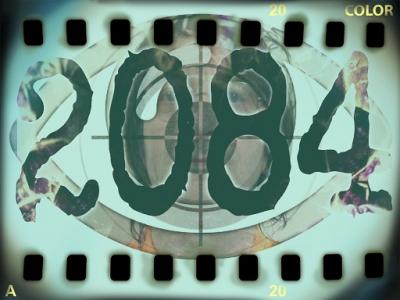
Underground Venues - 9th July (further shows 10th & 16th July)
This is a partisan political show. It comes from somewhere on the libertarian left of the political spectrum. I'd place myself thereabouts (voting for Jeremy Corbyn in the Labour Party leadership election). If you cheerfully voted Tory in May this may not be the show for you.
Pop and folk songs may not be the best media for expressing complex or difficult ideas: they work better at a more instinctive and emotional level. In 2084 there are references to the 'rebel songs' which are no longer part of people's lives. The premise of 2084 is complex: what would society be like after 80 years of a war against terror where social and political opposition was not tolerated and the grip of the state was total?
In some ways the world depicted in 2084 does not seem all that distant - the key problems identified are familiar to us today. Rapacious banking systems; global warming; limitations on personal freedoms; hostility towards strangers and foreign cultures. As Orwell supposes a fundamentally corrupt and failing social and economic system can survive only through repressive practices.
This is something of the context of this new piece. It is written and performed by Steve Roberts (piano) and Matt Hill (guitar). Images are projected onto a screen behind them (mostly an image of a naked light bulb) and the song cycle is broken by a pre-recorded narrative of a couple who have a copy of 1984 and who reflect on how life has changed since publication of the book.
Steve and Matt perform well - though there is no scope for direct communication with the audience; the 60 minute performance is unbroken. I got the feeling that they might have been glad of the opportunity to talk to us about the songs and how they came about. The songs were all accessible and there were a number of striking lines and images that raised them out of the ordinary.
The only cover was Paul Simon's Sound of Silence which was something of an epilogue. This was a brave choice - setting your own songs alongside one by an undisputed master of the genre. The fact that Matt and Steve got away with it says something for the strength of their own material.
I should have liked to have felt more challenged by 2084 than I was - for too much of it I felt that I was simply agreeing with it - and I was ready for some music that was more difficult. On the other hand I admired the intent, and the willingness to develop the project fully.
Keith Savage
ACAPPELLA AND CAKE - Ordsall Acappella Singers
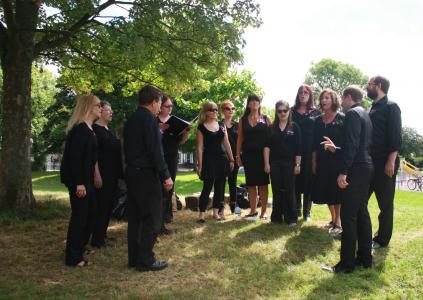
United Reformed Church and later at St Mary's Church 25th July
The 30-strong Ordsall Acappella Singers from Salford have become an established part of the Buxton Festival Fringe - mainly for their singing but also for their exciting range of home made cake (lemon, almond and polenta for me please). They are already planning to return in 2016 and I can only encourage you to put it in your diary when dates are announced.
Community based choirs have difficult choices to make. On the one hand they want to be inclusive, giving everyone the chance to sing, on the other they want to deliver performances that are as good as they can possibly be. The Ordsall Acappella Singers seem to have got the balance just right. Their musical director Jeff Borradaile seems to be the sort of positive and enthusiastic man you would want to lead you - instilling confidence, enthusiasm and helping you to relax and sing as well as you can do.
They have given more than 20 concerts in the last year and meet weekly to rehearse. Their repertoire draws mostly on popular song and they show good taste in their choices: I Got Rhythm; Smile; Blue Skies; Can't Help Falling In Love. Given the fact that they were singing in a church it was appropriate that they included some pieces that connected to the Christian faith - Deep River, Kumbaya and Joshua Fit the Battle of Jericho being the day's selection.
All in all a thoroughly enjoyable morning and the word is that the afternoon event at St Mary's Church went even better.
Keith Savage
ACOUSTIC CONNECTIONS WITH RAINTOWN SEERS - Raintown Seers
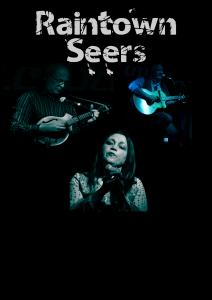
Underground Venues 20th July (further shows on 23-25 July)
This was a friendly, enjoyable and informative show and if music in the folk tradition appeals you I'd happily recommend it.
Raintown Seers have strong Derbyshire and Greater Manchester connections and many of their original songs - written by Neil Fisher - are rooted in local events and places. They began, however, with a song by Gillian Wells. Witchita says something about the American Dream and how it doesn't work out as people necessarily hope. The show is called Acoustic Connections and the band explained the links between songs where they weren't necessarily apparent.
Witchita was home to one of two factories where the B29 Superfortress was built. As many will know there are several plane crash wrecks still on the Derbyshire moors. One, near Bleaklow, is of a B29 which crashed in 1948. The plane - and the song - was called Overexposed.
Tens of thousands of British women married American forces who were stationed at bases during the Second World War. Many of these came from Derbyshire marrying husbands based at Burtonwood, near Warrington. Neil Fisher has written a song about these GI brides called Here Come The Brides.
This was followed by another of Neil's songs. Mermaid's Pool can be found up on the moor towards Kinder Scout. Legend has it that it is joined to the Atlantic - there is the connection - and that men were enticed by siren-like mermaids, never to be seen again. Neil had incorporated words from an old poem for his song.
While on the subject of Kinder Scout it was, perhaps, inevitable and necessary that we had a song celebrating the Kinder Trespass and its organisers. Benny Rothman was the song and it was played on two mandolins underpinned by a shruti box. During the war Benny Rothman worked on the Lancaster bomber - the British equivalent to the B29. This took us back to Witchita and to Jim Webb's classic song Witchita Lineman.
Apparently Webb met the schoolgirl Kirsty McColl in Paris and she told him that her father had written a famous song. But you don't really need any excuse to sing a song so beautiful and so perfect as The First Time Ever I Saw Your Face. This, and another Ewan McColl song The Bonny Ship were sung by Lisa Lovatt.
We finished with another song set in Derbyshire and written by Neil Fisher. Peter's Stone is a well-known landmark by the road not far from Litton village. It was also a gibbet stone. A young man called Anthony Lingard was - back in the day - charged with theft. He was tried, convicted and hanged at Peter's Stone in double quick time.
Raintown Seers are more jolly and fun than this narrative may lead you to suppose. They have an easy going manner about them. They sing and play well and they choose good songs. My only suggestion to them is that they try a bit harder to sell their CD!
Keith Savage
ALBION AND ALES - Albion
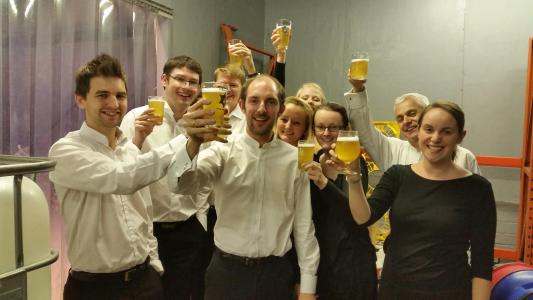
After a short informative introduction from the Musical Director, arranger and composer, who clearly appreciates his beer as much as his music, the 11 strong choral group began the concert with an arrangement of "Scarborough Fair", for solo baritone and choir with piano accompaniment, which was a pure delight, apart from the piano which sadly was a little too pronounced. To my shame I have never heard this group before, but I shall make sure I go again because they are very special.
The diction, intonation and ensemble is impeccable, and their dynamic range is magical - I have seldom heard quiet singing quite like it - barely audible but with an intensity of line and sound that is truly wonderful. They have the ability to work the acoustics of St John's like no other group I know, and their obvious enjoyment of everything they perform is palpable and mesmeric.
Frazer Wilson's arrangements are often out of this world, but yet the harmonies have a logic to them that I imagine makes them good to sing, though not always easy, and splendid to listen to. Frazer's ability to not use a perfect cadence at the end of a piece is often mystical and always just right, as is his easy light touch when talking to the audience.
We had a range of styles from 'in your face' "Oliver Cromwell", through "Vidi Aquam", Greensleeves, and an own composition "Invocation". This latter was amazing and again used the acoustics of the building to great effect. The Dives & Lazarus melody "I heard the voice" was a gem. The straight production (almost), of the Butterworth setting of Houseman's "Is my team ploughing?" made me realise more than normally what a very clever setting this is - poignant and evocative.
Placing the singers in different parts of the church, including the balcony, was truly inspired, and the mix of such accomplished singers sent shivers down my spine more than once - super! I'm sure Parry would not have recognized Frazer's harmonies for "Jerusalem" but he couldn't really object too much, after all it did give the melody new life and gave us a chance to realise what a really splendid tune it is.
I can't pick out any songs as being my favourites of the evening, because I adored them all, but the new life that was breathed into "Greensleeves", Crimond, and "Sally Gardens" made the whole performance even more memorable. They are back at Christmas - don't miss them.
Andrew Hodkinson
AMERICAN BLUEGRASS MUSIC - Aprille and the Shower
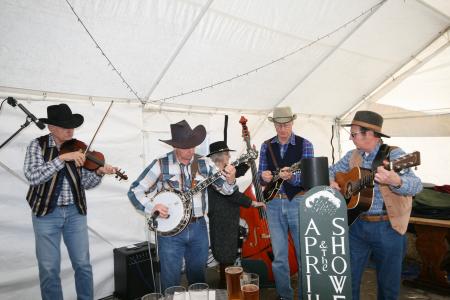
Despite its roots in American rural poverty, Bluegrass music is clearly designed to put a smile on your face; grinning and foot-tapping were much in evidence as Aprille & the Shower strutted their stuff in the main bar of the Railway Hotel. This is great music for pubs; bright, engaging and undemanding, but with hidden depths. Unsurprisingly, they had enquiries regarding availability for alternative engagements during the breaks.
Aprille & the Shower have a passion for the music that shines through in their performance, and were keen to share their knowledge of the origins of particular songs with the audience. Regrettably, much of their informative announcing was lost in the increasingly raucous atmosphere that accompanied the impending carnival procession.
The band play what is described as ‘traditional’ bluegrass, which means they eschew the use of electric instruments. The eponymous Aprille is not the lead singer; instead she plays the stand up double bass, which together with the self-effacing acoustic rhythm guitar of Tim Baker provides a rock steady foundation for the rest of the band. Steve Read plays the mandolin in a forceful manner, with most of the more melodic moments going to John Leary on the banjo. The band usually plays with a fiddle, but due to illness we instead had stand-in steel dobro from Ian Wooley. It is a tribute to Ian that you would not have guessed that he was a temp – many of his musical inserts were truly delightful, including an excellent guest lead vocal on ‘Carolina Star’.
The lead vocals were generally shared by Read and Leary. I initially thought that one specialized in baritone parts and the other tenor, but as the gig progressed they swapped this around. The two voices blended very well in harmony. On occasion, the rest of the band would join in for a 3-part harmony. Initially the 3-parters were a bit shaky, but this got better as the voices warmed up.
The band told me they perform on a regular basis in Bollington and Castleton, so next time you’re passing through these locations you could do a whole lot worse than checking them out; just be prepared to tap your feet and have a smile on your face.
Fred Rolland
�
A BASIN OF JAZZ & BLUES - Basin Street Jazz & Blues
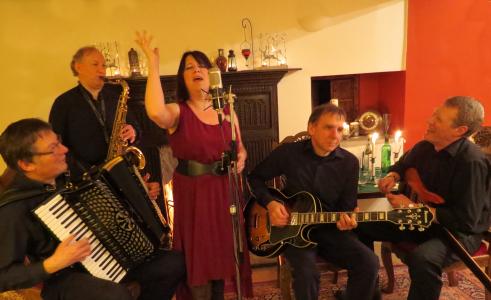
July 12th (further show July 20th)
This was a very agreeable way to spend Sunday evening after a long day in the Pavilion Gardens. The Old Clubhouse is a very Fringe-friendly pub and their especially brewed Fringe ale - Thespian - is proving to be popular, and rightly so.
Basin Street Jazz and Blues produced a very handy programme listing the 34 songs and tunes to be played. They also gave some interesting notes about the history of the songs and some autobiographical background. A lazy reviewer's dream.
Most of the pieces will be familiar - apart from a handful of very decent originals. This can be a bit of a mixed blessing - it can be helpful to hear music with which you are familiar, but what if it is dreadfully mangled? Happily Basin Street Jazz and Blues don't do mangling. So with a song as familiar as Summertime (over 25,000 recordings it says in the programme) they emphasised the blues line that underpins it whilst fully respecting the melody.
For me - and judging by the applause I wasn't alone - it was the full-on blues pieces that worked best. The first set included I Want A Little Sugar In My Bowl and the second I Put A Spell On You and Trouble In Mind. (My affection for the Jimmy Witherspoon & Ben Webster version of the latter is unbounded and so I was a bit nervous about hearing this - but no need, BSJ&B do a fine rendition).
It is obvious that singer Jules M Scott loves the likes of Nina Simone and Peggy Lee and these must be good influences to have. She is very well supported by an experienced and versatile quintet who showed their be-bop credentials with Yardbird Suite and Groovin' High.
Mike Dale is a warm and fluent tenor player, Fred Rolland has a nice staccato attack in his guitar solos. Brian Lightowler's piano playing is well-matched to the style of the piece and his piano-accordion provided sympathetic colour to the French songs in the programme. Adrian Sherwood's bass guitar provides security at the heart of the sound and his song When Will You Sleep Tonight may have been the pick of the originals. Drummer Dave Attwood is a modest chap evidently; he seems to have missed the photo call for the programme. It goes without saying that every band needs a drummer, and Dave does a splendid job for Basin Street Jazz and Blues.
So, this was a very good Sunday night gig. Jules and her men are back next Monday: I'll wager that they will be just as good then.
Keith Savage
BELLISSIMO - ITALIAN OPERA HIGHLIGHTS - City of Manchester Opera
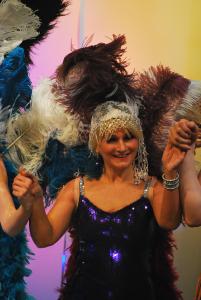
An evening of Italian Opera Highlights with the City of Manchester Opera, Conductor Juan Ortuno, and accompanist Jonathan Ellis; and Highlights were in abundance. This group of 27 singers (12 Men and 15 Ladies) gave us an evening of mainly Puccini, spiced with a couple of other composers of note! The evening kicked off with the Bell Chorus from Leoncavallo's Pagliacci and a rousing big sound it was.
Then we turned to a little known opera by Puccini - La Rondine (a new one to me), which was an opportunity to hear some solos and ensembles, and very convincing they were too. This was followed by a snatch of La Boheme with a couple of solos, from John Piper as Colline, and a very convincing Musetta in Joan Dean.
Then we had Gianni Schicchi, Madam Butterfly, and before the interval Tosca. There were times when I had to remind myself that this group is essentially an amateur association, as there were some powerful, and fine voices, and all more than ably accompanied by Jonathan Ellis. For my taste the volume was a little too powerful and full-on for too much of the evening. I needed a little light and shade, but the selections didn't really provide much opportunity for quiet singing.
In the second half we heard another rarity, namely Mascagni's Iris - perhaps a contender for a future Buxton Festival Opera! We were also treated to La Wally by Catalani (another underrated opera). Pagliacci returned with 'Si puo, Si puo' well presented by Arron Long. The two sizable excerpts from Turandot, and Cavalleria Rusticana completed the second half selections and it was clear that these favourites really work with audiences and performers alike. What better piece to close with than the 'Brindisi' from , Cavalleria, except of course with the 'Easter Hymn', and to have them both was a bonus.
John Elliott, Heather Heighway, and Lucy Lee were excellent in their solo roles - much enjoyed by the audience.
Jonathan was, dare I say it, a little too bravura for some sections, but the CMO are so lucky to have such a fine pianist. Juan Ortuno more than ably directed the forces, and in a lighthearted but informative way he explained the items as they came along. He should have used the microphone and maybe spoken a little slower for all the audience to appreciate everything he told us, but he is clearly knowledgeable and enthusiastic.
Enthusiasm is of course the groups stock in trade, and it becomes infectious - but sadly it can't hide occasional lapses in overall ensemble, and clearer diction. Intonation, however, was mostly brilliant, and a good time was had by all. Just a slight niggle, and that is to wish the chorus would look at the conductor, and not bury their eyes in the copies - that way the audience would have felt more involved and communicated with. However, it was a very enjoyable evening - thank you!
Andrew Hodkinson
BIG ROCKIN' BLUES NIGHT - HerdingCatz Blues Band
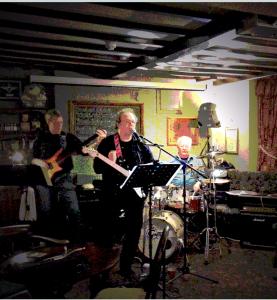
The Herdingcatz Blues Band are a local outfit, most of whom have been around the local music scene for a while. This line-up though has been together less than a year, but they sound terrific!
Playing mostly instantly recognizable classics from the blues, as well as some lesser-known numbers, the band were tight and gave us a polished performance from start to finish. Songs such as T-Bone Walker's 'Stormy Monday' and Sonny Boy Williamson's 'Help me' (playing on iTunes as I type!) have certainly been widely covered, and the guys were confident in their handling of the material.
The venue was full, mostly of new faces I was told, and were fully appreciative of the show. Fringe regular Sam Smiles was also in attendance and was stomping his foot with the rest! (Sam's 'Trombone Tales' is on tonight if you're interested). It would have been nice to see young faces in the audience, but that's not down to the band.
One of the best local bands I've seen in a while, they are back on Saturday 25th July, so get down to some low-down blues at the Clubhouse!
Dr Ian Parker Heath
COME ALIVE CONCERT - Alexander Arts
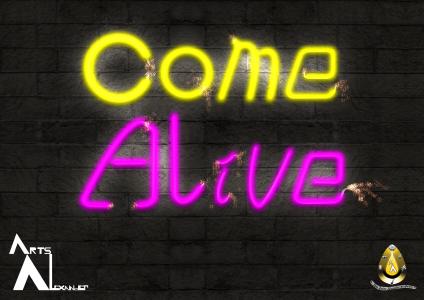
Wow! This show just blew my socks off! What an amazing evening and a lot of talented young musicians. It was a delightful experience from start to finish and what a pity it was for one night only. The 40 strong audience really enjoyed it – there was a lot of toe-tapping at the front and full-on dancing at the back. More next year please.
Opening the show was Eleanor Jayne (a.k.a.Ellie Hibbert) the only Buxton musician. She sang five cover songs, including ones by Amy Winehouse, Adele, and Nina Simone. Despite opening nerves, Ellie has a strong stage presence and a beautiful, almost feathery, voice which is clear and haunting. She also accompanied herself on the piano. I particularly liked her interpretation of Alicia Keyes’ “Empire State of Mind” which was delicate and moving.
Next up was May/Mae or Summer – sorry there was only a hand-written list of acts hastily jotted down for me on my way in (thanks Milo) - and on stage introductions by the acts themselves were a little quick to catch. Mae/Summer is a really talented singer and accomplished guitar player. She opened with “Safe and Sound” by Taylor Swift, which was really suited to her strong, well-controlled voice. She also played and sang Jolene with power and emotion. I would really like to hear her sing/play one of her own songs.
Another Manchester act were Ruby and Casey who perform separately and together. Ruby played an electric steel-string acoustic guitar (I think) and Casey played an electric guitar: the two sounded fantastic together, especially as Casey used some interesting pedal effects. I really loved their version of “Pale Blue Eyes” by The Velvet Underground. It was magical. Their singing in harmony was wonderful. There was also a really engaging, up-tempo original song by Casey called “The Journey”.
The headline act were a high-energy band from Oldham called “Indigo Empire” who only formed in 2013 but who look and sound like they have been together forever. They really gave it everything – and what a strong, rich, fabulous sound. With Joe Dawson on drums, Jack Taylor on lead guitar, James Hodgetts on rhythm guitar and Steven Collins on bass they played and sang a range of rock/rock’n’ roll classics, from “Hey Joe” by Jimi Hendrix to Presley’s “Hound Dog” and “Sweet Home Alabama” by Lynyrd Skynyrd. They really rocked it, playing skilfully together, and looking and sounding like they were enjoying themselves. The audience loved it and young fans at the back were dancing. They also performed their own song “City of Mine” which you can listen to on SoundCloud. It was a shame that the mixing balance wasn’t quite right as I wanted to hear the vocals more clearly (a minor point.)They were a little over-powered by the guitars.
Well done to all the acts and the organisers. You set the bar really high. An excellent range of styles and sounds – a fantastic show for all ages and some names to look out for…I certainly did “Come Alive”!
Karey Lucas-Hughes
DALE STORR - SOLO NEW ORLEANS PIANO - Dale Storr
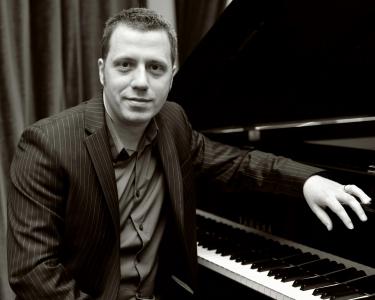
The Old Clubhouse
18th July
After two two-hour sets at The Old Clubhouse I imagine that Dale Storr was a tired man. Let us hope that he was also a happy man, knowing that he had entertained so many people so richly.
The Clubhouse has emerged as something of a jazz and blues hub this Fringe and its room upstairs is ideal for relatively informal music-making. Dale has played here before and previous gigs had added to his ever-lengthening list of admirers. His introduction to jazz piano came through his parents' record collection: the rock and roll of the likes of Little Richard and Fats Domino leading him to investigate earlier pianists such as Professor Longhair and Jelly Roll Morton.
Dale gently takes us through a history of New Orleans style piano - name-checking the likes of Huey Smith, Allen Toussaint and Dr John. Dale's piano hero is James Booker who died tragically young in 1983. Dr John famously saying of Booker: "He was the best black, gay, one-eyed junkie piano genius New Orleans ever produced."
In Dale Storr's playing and singing there isn't much tragedy - much more of the exuberance and life-affirming spirit that is possible in making music. Highlights of the set I heard included Dr John's Dorothy and Such a Night, Toussaint's Mother-in-law and Booker's Classified.
We need more music like this on the Fringe. Thanks Dale for showing the way.
Keith Savage
AN EVENING OF MILDLY AMUSING WICKEDLY LYRICAL SONG - Sideways and Serrated
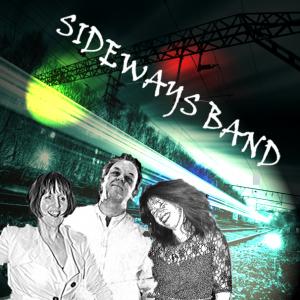
This was a friendly and enjoyable entertainment - the sort of thing that only the Fringe can deliver. Those arriving first got to sit on a comfy sofa (latecomers had to make do with some random office furniture). But this doesn't matter too much - all are made welcome amidst the shelves of children's books on the first floor of Scrivener's Bookshop.
Richard Watson (from Serrated Theatre) took the first half of the show. He sang half a dozen songs from Behind the Blinds (which can be seen and heard at the United Reformed Church later in the Fringe. Richard seems to be a nice man - but this is a ploy to disarm you. He has 20 songs about his neighbours and some of them are rather candid; not necessarily the sort of thing you would want broadcast. We heard about the film geek with doubtful personal hygiene doomed in his pursuit of the woman of his dreams. There was the case of the women erotically charged by bookshops - though you may not meet her in Scrivener's. There was this chap who never quite got to where the action was - invariably in the wrong room at parties "more winned against than winning."
Other songs reflected on those chance encounters that don't happen - those many missed opportunities that do not change our lives - and the hopelessly ill-matched couple that were finally divorcing and throwing a party to celebrate. Not to mention the couple that perhaps knew one another a bit too well and could benefit from something fresh, surprising and exciting.
Richard accompanies himself on the piano and sings with wit and intelligence, bringing the characters to life. Behind the Blinds should be worth seeing.
Peter and Rebecca (from Sideways Band) took the second half of the show and sang, mostly, 'naughty' songs. Tom Lehrer's Masochism Tango, Fascinating Aida's Dogging, Tim Minchin's Inflatable You - about the advantages and pleasures of a blow-up lover. You get the idea. These songs work so well, of course, because they aren't delivered like rugby songs. There is a certain refinement about them which gives a greater payoff.
Keith Savage
EVENING SOLO 'CELLO RECITAL - Melanie Dawn Jones, Cello
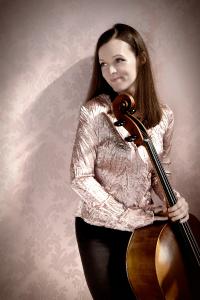
St Mary's Church, 17th July
Fringe audiences were spoilt for choice this Friday night. I could have heard a youth orchestra that I knew would be brilliant. There was an early music ensemble that was certain to be special, but I chose to go to a solo cello recital in a church set away from the town centre. Did I regret this choice? Absolutely not.
St Mary's Church is, people keep telling me, is an excellent example of the Arts and Crafts style and was built during the First World War. The interior is unfussy and calming; it has a sympathetic acoustic and the people who worship there are a kindly lot.
Melanie Dawn Jones chose a demanding programme, for herself as well as the audience. It was solo cello music that was contemplative, and required concentration. You could have heard the proverbial pin drop, so absorbed was the audience.
The largest part of the programme came from Bach's cello suites - core to this repertoire but fiercely challenging. Melanie played the whole of Suite No 2 in D minor. Her tempo was deliberate and I have heard accounts that were a little faster, but this is not music to be hurried over.
Melanie also played a 20 minute Sonatina written for her in 2013 by Robin T Kiel. In her introduction she suggested that the piece - inspired by visits to different gardens - was like a journey through contrasting landscapes. One movement - Variations in Memoriam - included quotations from Beethoven and Schubert apparently but I am afraid I only caught a theme from the Pastoral symphony.
The remaining piece in the recital was Melanie's own arrangements of Gershwin's Summertime. You might have supposed this to be a straightforward account but you would have been wrong. The song - detached from the musical - is frequently presented in a rather sentimental way. Melanie approached the melody tentatively and obliquely never giving it fully. The hints and fragments suggesting the real tragedy of Porgy and Bess.
This was an intelligent and rewarding recital in an excellent Fringe venue. I look forward to hearing Melanie again.
Keith Savage
AN EVENING WITH THE SOVEREIGN SAXOPHONE OCTET - Sovereign Saxophone Octet
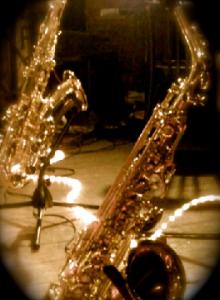
Buxton Methodist Church 19th July
The only musical instrument that I have ever tried seriously to play is the saxophone. The fact that it defeated me comprehensively does not stop me loving the sounds that can be got from it or from imagining that one day I will wake up and find that I can play like Ben Webster or Ornette Coleman. So I'm a sucker for a saxophone octet.
Helen, Gordon, Dave, Caroline, John, Mike, Steve and Dorothy also love the saxophone - the difference being that they can play the thing, and play it rather well at that. Now this gig was not a collective improvisation for eight horns - though had it been I'd have been there. The arrangements were pretty tight with few spaces for improvising.
So I'll make two observations: I enjoyed the evening very much but would have been happy if there had been space for the musicians to stretch out a little musically. Secondly, to my old ears the balance of sound sometimes favoured the lower instruments a bit too much. Two baritones and two tenors is a lot for the smaller horns to take on. But enough of the carping.
The first half of the programme was all music from the age of Jazz - starting with Tiger Rag in a stirring arrangement by Dave Webber. Another jazz standard - the bluesy Black Coffee - provided a little more aural space for the different sounds to come through.
The rest of the first half was made up by more recent arrangements by friends of the Octet - Don Ashton and Pauline Gordon. Don's contrasting pieces Dream and Reality took us to the interval. Dream opened with a baritone introduction leading into a slow ballad-like theme; Reality was suggestive of a more crowded environment where space had to be fought for - though in the end tensions were resolved. So, optimistic then.
After the interval began with three short arrangements of music from the classical - essentially pre-saxophone era. The 16th century Italian "Canzona" was particularly attractive and an arrangement of a Vivaldi trumpet concerto movement was good fun.
The highlight of the evening for me was Richard Ingham's Mrs Malcolm, Her Reel. It began with an authentic enough reel which became submerged in the one piece that allowed for any significant soloing. 'Raucous' was the adjective offered to describe it - either way it suited me.
A 'lust song' - The Sheik of Araby - and an Ellington Orchestra standard Caravan (a song I never tire of) completed a thoroughly enjoyable programme which presented a good variety of saxophone sounds. An encore of Tiger Rag - with an invitation to the audience to sing the chorus rounded things of nicely sending us out into the night with a spring in our step and a song on our lips.
Keith Savage
�
FEELIN' GOOD WITH DALEDIVA - DaleDiva chorus
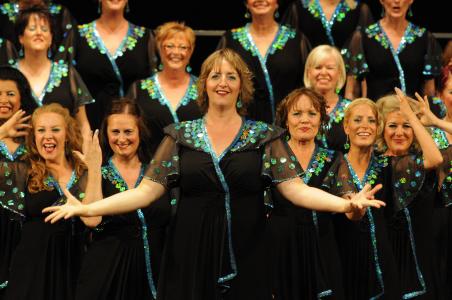
St John's Church 25th July
This has a happy and enjoyable way of spending the last Saturday evening of this year's Fringe. DaleDiva is an all-woman acappella chorus based around Cromford. They have a round 70 singers in total - with 56 on stage in St John's Church for this performance.
DaleDiva are off to Las Vegas to represent Britain in the Sweet Adelines International World Championship this October. They will surely do themselves, Britain and Derbyshire proud.
For this show they were dressed in black with glittering sashes which were matched by the sparkle in their eyes. This is a choir that absolutely loves to sing and to entertain. Their performances do them good as well as the audience.
They delivered a full programme of songs and dance (including three songs by a quartet of voices). The chorus has an impressive dynamic range and control in their four-part harmonies. Their repertoire draws largely on popular song and I'm not going to pretend it was all my cup of tea - but I don't think that One Direction and Bruno Mars exist to entertain old men!
The Divas do some of their own arrangements which ensures a freshness in their sound and they treated us to a preview of one of the pieces they will be signing in Vegas. We were sworn to secrecy but it is safe to say that it was an exciting arrangement done just for them.
See more and hear more at a special, free show in Matlock on September 19th.
Good luck in Las Vegas DaleDiva!
Keith Savage
FLUTE & PIANO RECITAL - Rachel Johnson & Jemima Palfreyman
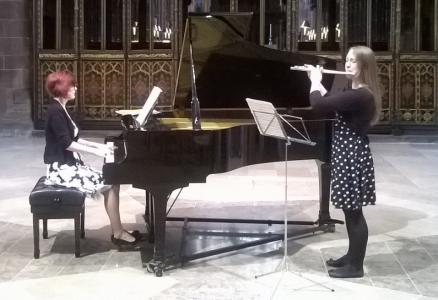
St John's Church 21st July
This was a most welcome return to the Fringe by Rachel and Jemima - both excellent musicians who make for a brilliant combination.
All of Jemima's considerable experience was called upon to cope with the church piano which had some keys that stuck and pedals that didn't work, She apologised for what would be a "dry" sound and explained to me later that some sections of the Franck sonata relied on muscle memory, and the keyboard response was really important. All of that said I doubt that this seriously affected the experience and pleasure from the point of view of the audience.
The recital began with the first movement of Bach's Sonata in England Major. (I draw here extensively on the excellent programme notes provided). The movement was used as a prelude both in the sonata and here.
Georges Enescu composed his Cantabile et Presto in 1904 as a test piece for students at the Paris Conservatoire. The two contrasting movements showing brilliantly the range of sound and emotional diversity that the two instruments are able to offer.
Peter McGarr is a contemporary English composer. Born in Manchester he lives on the Pennine moors and that landscape influences his music. Rare Dawn is in five brief sections and it is intended to evoke early summer in the Pennine hills. It calls for some unusual effects and 'instruments' (a small music box and a water filled wine glass for example) but none of that got in the way of a really engaging piece of music making. The love song for the composer's wife would have dispelled any doubters.
This took us to the main item in the recital, Cesar Franck's Sonata in A major in four movements. This piece requires formidable technique of both players - though technique is not everything of course. I quote from the programme notes given: "themes from each movement are used and transformed in other movements across the sonata... While the flute is highly lyrical, the piano part is notably virtuosic and densely written. Franck reportedly had enormous hands, easily spanning twelve white keys on the piano." Franck requires his pianist to play major-tenth chords in the final Allegretto poco mosso movement.
This was a triumphant conclusion to the published programme but Rachel and Jemima were persuaded to return to play an encore - another contemporary English piece about hatching alien eggs which is popular in schools where they play. Fortunate pupils to hear them.
The St John's acoustic is excellent and the music sounded remarkably well balanced - when you consider the power and energy of the piano in comparison with the flute. Our thanks to Rachel and Jemima and we look forward to hearing them again in Buxton.
Keith Savage
FOUR SEASONS IN TWO HEMISPHERES - Amaretti Chamber Orchestra
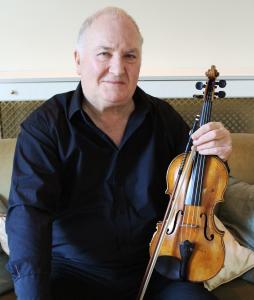
St John's Church 18th July
The Amaretti are regular visitors to the Fringe - for which let us give thanks - and there is always the danger that we take them for granted. Anyone present at this stunning performance will surely have gone away anxious to check their diaries for the next concert by this excellent orchestra.
The Amaretti are fortunate to have the services of a passionate and knowledgeable conductor in Marco Bellasi and, on this occasion, a world class soloist in Rolf Wilson. This combination surely helped the Orchestra to raise their game.
They began with one of William Boyce's eight symphonies - No 4 in F Major. These are short works - three movements in eight minutes - but make for an ideal aperitif: the restraint of the music preparing players and audience for the exuberance that was to come.
Piazzolla - who died in 1992 - is best known for his tango compositions but his tribute to Vivaldi's Four Seasons is not what you might expect. He composed the pieces that make up Four Seasons in Buenos Aires for a traditional tango band in the 1960s with the arrangements for string orchestra coming later. There are some quotations from Vivaldi's in the Argentinian's work but the similarities are more in the juxtaposing of periods of relative tranquillity and atmospheric calm with violent stormy passages.
The influence of the tango was most obvious in 'Winter' though dance like figures emerged from the cello in 'Autumn' (beautifully played by Mary Dainton). At the interval one of the players was asked of the Piazzolla "That sounded challenging but fun." She answered, "Yes, but the Vivaldi is more challenging in some ways."
With music like The Four Seasons which is so familiar and can be heard whilst waiting to be answered at a call centre near you it is easy to forget how thrilling an experience it is to hear the whole work played live. Rolf Wilson emerged intermittently as violin soloist in Four Seasons of Buenos Aires but he was, of course, thrust to the fore now. Rolf is an enormously experienced leader and soloist having played in world class ensemble. His style is not a flamboyant one, you sense that his energies are concentrated on getting the most from the music.
The performance - from soloist, conductor and ensemble alike - was full of drive, energy and purpose. They really did work as one to deliver a memorable event.
Keith Savage
HALLÉ CELLOS - FROM PURCELL TO PUCCINI - Hallé Cellos
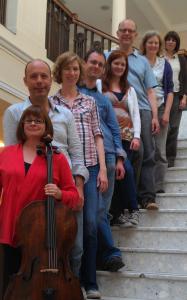
This was the third in a series of concerts in New Mills featuring cellists from the Hallé, but the first with all 8 of them, eagerly anticipated and sold out, with a hopeful queue for returns. This time they were impersonating an entire orchestra, and voices as well, in a programme of music from opera. We had Purcell Dido & Aeneas, Bizet Carmen, Wagner Parsifal, Puccini La Bohème, Gershwin Porgy & Bess, and Rossini William Tell – how’s that for ambition and adaptation?
The cello is famously considered the instrument most like the human voice in range and tone, and the big operatic tunes in cello lines evoke memories of wonderful singers in those roles, from Flagstad (long ago, I was a child), Ferrier or Janet Baker as Dido, onwards. The adaptations from full orchestra to single instrument group, largely by Patrick Gundry-White and Simon Turner, were inventive, resonant and thoroughly convincing. The players changed places in a sort of silent musical country dance for cellists between the pieces. Everyone got a turn at the big or poignant tunes, but also relished creating the accompanying orchestral effects. If you can get so much from 8 cellists, perhaps you can do without full orchestra and singers? There was certainly very much more to this music than merely the challenge of achieving much from few resources.
I wondered whether any other single-instrument group could have convincingly covered such a range. Apart from the nature of the instrument itself, it clearly made all the difference here that these are professional colleagues, who have spent countless hours working, playing, travelling and socialising together. Their ability to work together for tonal blend through technical coordination relies on this depth of musical and personal knowledge, normally managed through almost unnoticeable sign language and indications from the section leader as they sit in ranks in the orchestra. Here they were in a semicircle, clearly visible to us, but also to each other, communicating by eye contact and body language with each other, and by their evident pleasure in the music and each other’s skill and expertise, with us the audience.
We were also given a brief and irreverent introduction to each opera’s story in turn. Starting with Dido “she says go, and he goes, and she ... dies”, followed by Carmen “she leaves him, he gets so cross he ... kills her”, this Sunday morning’s happy concertgoers were encouraged to laughter at the way opera plots are so often doomladen. When it came to Parsifal, at least one Wagnerphobe in today’s audience remarked on the (lovely) likeness between the fragment of Parsifal we heard and the Siegfried Idyll, a piece that Wagnerphobes can also love.
We felt ourselves most fortunate to have music of such quality on our doorsteps. The coffee-&-cake Sunday concerts as arranged by local resident and Hallé cellist Dale Culliford, are a regular source of pleasure, featuring on the Fringe but also at other times. By now you’ve missed this year’s, but mark them for another year, another Fringe!
Ursula Birkett
LOCAL MUSICIANS' SHOWCASE CONCERT - Club Acoustic

Performing for over 20 years, Club acoustic has definitely not lost its touch! Exuding calm and serenity, the atmosphere of the Old Club House perfectly complements the raw and un-plugged performances of the five musicians.
Utilising an eclectic mix of styles, all performers demonstrate a clear level of skill, whether in voice or their chosen instrument- ranging from acoustic guitars to violins and saxophones. All performers were local and each set brought a sense of community to the whole night, encouraging audience members to sing and clap along when they feel compelled!
Although not overpoweringly energetic sets, all still created an ambiance that was appropriate to both setting and style. Every musician and spectators clearly shared in a united appreciation of the performed material, personified in the performance of James Taylors ‘see you again’, executed by Steve Lewis; which had everyone singing along!
A captivating moment of the night was definitely the performance of Dropping Stones into the Water, an original song written by Not Them Again (Stuart and Dave), inspired by Rudyard Reservoir in Leek. Filling the room, this reflective piece captured the essences of the composers’ inspiration of dropping stones, which was clearly conveyed to the audience.
To sum up the experience, there is no better words than that of the host. “We’re not always a club: we’re not always acoustic, but we’re always about the music!”.
Maia Miller-Lewis
MUSIC ON TAP - Tap House - Buxton Brewery
The Tap House
July 14th, 9.30 - midnight (further shows on 15th, 16th, 17th, 21st, 22nd, 23rd & 24th)
For Buxton locals The Tap House has established itself as a venue of choice for the discerning drinker. Buxton Brewery produces an impressive range of acclaimed ales - some of which may be stronger than you are accustomed to so don't rush your pint! (Tea, coffee and hot chocolate also available!) A friendly atmosphere is guaranteed and there is a happy mix of customers - students like it and you'll find some older friends there too.
The Tap House is also home to a good variety of live music - accessible yet a bit more adventurous than much pub fare. Over eight nights of the Fringe the Tap House is hosting a mix of bands and singers mostly from the more relaxed end of the spectrum.
First up was Honeyfeet - a three-piece from Manchester - who lived up to the promise by "mixing old folk forms, blues, grooves and jazz chords to create a unique style of their own." The supple combination of voice/flute, guitar and keyboard had people up and dancing from the word go.
The Tap House is the last place to close it seems - so even if you can't make the whole night do drop in before setting off for home!
Keith Savage
OPEN REHEARSAL - Kaleidoscope Community Choir
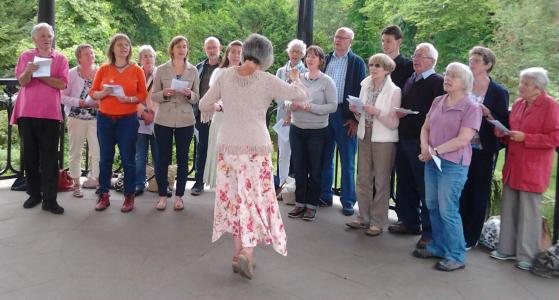
My first review for this years Fringe, and what could be better than Carol Bowns and her Kaleidoscope Community Choir. All keen enthusiasts, and if they weren't when they first joined they certainly would be after a few minutes of Carol and her infectious enthusiasm. She is a power-house of drive, fun and professionalism.
Because this was an open rehearsal it was very informal and relaxed, but purposeful and musical. After a brief introduction about the choir, how it started and where and when it gets together, Carol launched us all into a roller-coaster of singing and fun. No-one could ever feel threatened, or side-lined. It is all wonderfully inclusive, easily achievable, and liberating. Consequently the standard of musicianship is amazing both to the listener, and the participants.
We had scales and arpeggios to start, but in such a way as to make them feel totally normal - even ordinary. How? Just by singing a song. Before you know what's happened you are singing in parts, and rounds, and harmonies, and all without the need for note-bashing and note-reading. You can't fail to want to join in - and why wouldn't you? This is just a smile set to music, that everybody makes themselves, and goes away feeling so much better for the whole experience.
The music ranges from Renaissance to The Flying Pickets and all with great musicianship and flare. Like all good teachers, you don't realise until the end that you have been on a steep learning curve about singing, music making, musicianship, and great togetherness. Well done - Live Long and Prosper Kaleidoscope and Carol. Thank you for a great experience.
Andrew Hodkinson
ORCHESTRA CONCERT - High Peak Orchestra
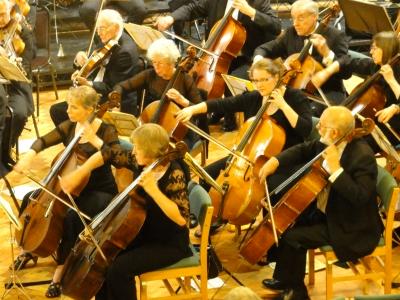
A very large audience thrilled to High Peak Orchestra’s impressive performance on Sunday with a particularly ambitious programme featuring Dvořák’s Festival Dance as a rousing opener followed by Rachmaninov’s Rhapsody on a Theme of Paganini and in the eagerly-awaited second half, the little-performed Bruckner’s Symphony No 6.
The Orchestra’s performance of Rachmaninov reminded us just how many variations on a theme were involved in this, from the urgent and threatening to the shimmeringly beautiful. Fascinatingly, we are told in the programme that the well-known 18th Variation that closes the middle section, a favourite of the composer’s, is simply the Paganini theme played upside down in D flat major. The soloist Ryan Drucker, a fourth year undergraduate pianist at the Royal Northern College of Music, brought the house down with his cascades of sparkling notes and worked hard to forge the perfect balance between himself and the orchestra. In a deserved encore he wowed us all over again with Schumann’s mesmerising Träumerei (Dreaming).
In the second half, Bruckner’s 6th was performed with great assurance with a particularly driving and menacing Scherzo movement and a climactic finale. The horns section was excellent throughout.
The cathedral-like acoustic of St John’s, the detailed, anecdote-packed programme and conductor Andrew Hodkinson’s easy humour with the audience all added to the pleasure of a delightful summer concert.
Stephanie Billen
PARTITA: EARLY MUSIC CONCERTS - Partita
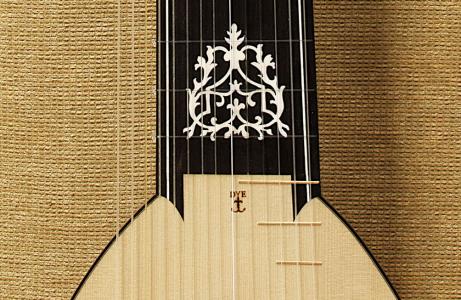
There were two different groups performing in this concert. They were the Partita of 5 players playing ancient music and Stringboxes which consisted of two musicians playing African, South Eastern European music and new compositions. Holly Marland performed in both the groups linking the old to the new.
The idea of the old and the new was a theme in this concert. It started with Diego Ortiz’s Pazzamezzo Antigua and ended with Pazzamezzo Moderna.
Detailed notes were given about the pieces which were performed. Also the performers talked about important features of the music before they performed them. This helped to engage the audience.
Partita is a well established group in the fringe with an enthusiastic following. As many as 60 people came to enjoy the music in this concert. The 5 musicians are very versatile and played a large number of instruments including the viol, lute, recorder, harp, seashells, harpsichord and numerous others used in early music. Pure instrumental pieces were interspersed with vocal works sung by 2 sopranos. All these works were performed with vitality sensitivity and captured the immense beauty of the music. The lute solos were for me a particular highlight. The singers communicated the ideas behind the song convincingly.
The modern element featured in the works was composed by Holly Marland and Michael Cretu. Holly sang her compositions Whispers of the Beloved and the Mystic Bird. The first one used the words of the Persian mystic and poet Rumi, the second was about the migration of birds to Africa in winter making an analogy with the human condition. She sang these to the accompaniment of the kora which she played herself. The melodies had a haunting feeling about them and it seemed that they had floated in on a breeze from afar.
The double bass player, Michael Cretu, was also amazing. He accompanied many of the works performed on the kora. I was impressed by Michael’s Dance and Improvisation. It had a strong Romanian feel about it using a 300 year old Romanian gypsy song as a central theme. Holly and Michael’s joint improvisation was a delight to hear.
My favourite work was Allo Madam which was written by Jali Musa Saho and is breathtakingly beautiful.
Roger Horvath
PEAK DISTRICT STRING ORCHESTRA CONCERT - Peak District Music Centres
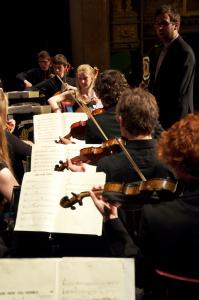
The Peak District Music Centres have been around for over 20 years providing musical training and opportunities to perform for young musicians across the High Peak. Many of the players can be heard in the Derbyshire County youth bands and orchestras as well as in the Peak District ensemble which are probably as strong now as they have ever been.
Indeed the String Orchestra - over 30 players - had come straight from the Music for Youth National Festival 2015 in Birmingham to play in Buxton tonight. Their playing in Birmingham had earned them a Certificate of Achievement Innovation and, as their conductor Ian Naylor proudly announced we were listening to one of the best youth string orchestras in the country.
The MFY adjudicators had noted the orchestra's control of light and shade, the extraordinary dynamic range, the glorious cellos. After a tiring and exciting day it would have been understandable if the Orchestra was not at its best. Any concerns on that score were quickly dispelled. From the opening notes of Vivaldi's Concerto in B minor for Four Violins the Church was filled with thrilling sound. The initial Allegro was propelled by driving ensemble work; the subsequent Largo had grandeur and grace. The interplay between the soloists - Isobel Barber, Lydia Barber, Jenny Chennells and Megan Shires - was deft and dazzling. Emma Furness provided confident and secure cello support.
It was a pleasure to hear Telemann's Don Quixote Suite not least because Jason Curteis provided the witty narration. Jason has taught string players - often the very youngest - at the PDMC for many years.
Musically the real revelation came after the break when the Orchestra played Tchaikovsky's Serenade for Strings. This is such gorgeous and seductive music anyway and you quickly forgot that you were listening to young players - so assured, convincing and gripping was the playing. This was one of the pieces that had so impressed in Birmingham earlier in the day. Little wonder!
By way on encores we were given a movement from Gorecki and a Pizzicato Polka for a bit of fun to conclude. This really was an excellent concert and it was a great pleasure to see orchestra and conductor taking such obvious pleasure in working together.
Keith Savage
PIANO RECITAL - Jonathan Ellis
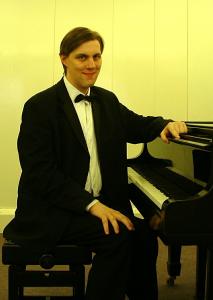
Buxton Methodist Church
24th July
Jonathan loves playing the piano. I had to leave while he was on his second encore (Mendelssohn). For all I know he is still playing yet.
Jonathan is a well established Fringe performer, either as a soloist or an accompanist, and many of his audience were 'returners'. On the evidence of this recital he can expect more repeat business next year. At the interval one person told me that she felt privileged to be able to watch and hear such an accomplished performer at close quarters. Another said that Jonathan was better than some of the pianists he had heard giving recitals in the Buxton Festival.
Jonathan is not a flashy or demonstrative musician (though even he looked stunned once or twice by the sound he produced during the Mussorgsky). His body and head are mostly still; his eyes are often closed (almost all of the two hours of music was played from memory). Jonathan readily shares his passion for, and knowledge of, the music in his introductions to the pieces. He revealed that one teacher had told him long ago that he played "like a. Russian". What was meant to be a criticism he happily took as a compliment.
Jonathan plays with passion and energy and whilst he demonstrated in his playing of Schubert, for example, some lyricism and tenderness I doubt that 'limpid' would often be an adjective used to describe his playing. As he told a member of the audience who inspected the piano at the interval, "It's still standing, I haven't hit it hard enough yet."
Jonathan began his programme with Mozart's Sonata in A Minor (one of only two minor key piano sonatas that Mozart wrote he helpfully told us). On a slightly chilly July evening this was the perfect way for pianist and audience to warm up.
Next came Mussorgsky's Pictures at an Exhibition which is probably better known in its orchestral arrangement. This is richly evocative music yet full of melodic interest. At times it felt like an orchestra was in the room, so full and complex was the music. His clarity of thought and purpose guided us through the maze of music and he drew cries of 'Bravo' from the audience.
After the interval Jonathan played Schubert's Four Impromptus Op. 90. This gave him the chance to show the more lyrical side of his playing - especially with the third in G flat.
He concluded the published programme with a shortish piece by Scriabin who died 100 years ago. Sometimes called "the Russian Chopin" the Fantasy in B minor comes from Scriabin's earlier Romantic period. It probably isn't a great piece of music but it was an engaging and appropriate tribute to a composer who is often overlooked.
This was a most enjoyable performance and Jonathan will always get a warm and enthusiastic welcome from Buxton audiences.
Keith Savage �
PIÈCES MUSICALES - Les trois amies

The Green Man Gallery 24th July
This was a lovely way to begin a Fringe Friday evening and the capacity audience at the Green Man Gallery clearly agreed.
Soprano Carol Bowns and pianists Marianne Kelly and Heather Sargeson met as students at Sheffield University - and though hundreds of miles now separate them they have found good reason to play together. For this occasion they chose 'some of their favourite repertoire' - and who would not want to listen to the sumptuous melodies of Faure, Debussy or Chausson?
Marianne and Heather began with four pieces from Faure's delightful Dolly Suite - written in the 1890s. Carol then sang three songs, also by Faure. Au bord details l'eau, Clair de lune (no, not the nursery rhyme) and Les roes d'Ispahan are all love songs of a different sort - the degrees of romance and yearning vary - and they were suitably played and sung.
The configuration of the stage area probably didn't allow for it but it would have been better if Carol could have been in front of the piano. It was always going to be difficult for her to be heard as well as would be ideal.
Poulenc's Sonata for Piano Duet and Debussy's Petite Suite followed. Talking to visitors to the Gallery who were upstairs for the Art Trail launch I was told how wonderful it was to hear this music making it's way through the building. I'm glad to know that so many people were able to enjoy what the audience did.
Carol returned for three of Ernest Chausson's Sept Melodies. More songs of love, romance and adoration - but it was a programme of French salon music, what else should we want or expect?
Heather and Marianne concluded the programme with three short and evocative selections from Bizet's Jeux D'Enfants.
That allowed just enough time for a well earned encore - not French this time, from Walton's Facade (odd the snippets of music that have turned up in different Fringe shows this year).
The audience left reluctantly - delighted and happy. Here's hoping our performers felt the same way.
Keith Savage
�
PROTEST SONGS - Darren Poyzer

It was with a slight trepidation that I approached this gig; would it be overly earnest and dark? Any worries I may have had were immediately dispelled within seconds by Darren’s easy going charm and humour. Make no mistake, this is a man who is passionate about peace and social justice; he just also happens to have an excellent sense of humour and an engaging stage presence.
Darren is also clearly a natural musician. Accompanying him for the first time was Purcy (sic) on the harmonica. They claimed that they had only played together once before the gig, a claim reiterated in a quick post-gig interview. You wouldn’t have guessed it – Purcy’s playing seamlessly intertwined with Darren’s soulful singing and guitar-playing. On one song he got out a saw which he played to great violinic effect. The impromptu aspect of the performance was further enhanced when Darren dragged a musical associate by the name of Royden onto the platform to sing the lead on ‘Worried Man Blues’.
Darren largely steered clear of well-worn material, plucking out lesser known songs by the likes of Damien Dempsey, Ed Pickford and Stan Rogers. Composers unfamiliar to me they may be, but their work stood up well in comparison the better known material by Dylan, Springsteen and Florence Reece. Darren is a fine curator. He also included two of his own songs, the heart-rending ‘Julie Rainbow’ and the ‘Peace to End All Wars’. The latter was a true show-stopping finale, making clear exactly where Darren’s sympathies lie on the great questions of today.
One unusual aspect was the use of graphics and film inserts to accompany many of the songs. This was very well-done – the images were engaging, appropriate to the songs and synchronized perfectly to the lyrics. Done badly, this could have been a distracting gimmick; instead it was a brilliant enhancement.
Darren has the ability to get right inside a song – his diction is perfect, which is so essential for this type of music where every word counts and he has the ability to exude raw emotion whilst staying tuneful.
Altogether, an excellent hour and a quarter in the Pauper’s Pit. It is no surprise that many of the audience were repeat visitors from last year’s gig.
Fred Rolland
SAM DUNKLEY - Performing Arts etc
Word on the street, well among Fringe reviewers anyway, was that this would be good; and so it proved to be. After a break of four years Sam was back at the Fringe with and this time he was not alone.
This one-off show was a return to Buxton for one of the Fringe's favourite sons and he was on top form. With a mixture of self-penned, traditional songs and covers this showcased Sam's talent to it's full extent. The songs were as you might expect, and Sam told us, covered the usual themes, divorce, highway robbery, love and loss. All were delivered impeccably and with a good helping of self-deprecating humour.
Sam was ably assisted by Ben, who looked like one half of a younger version of The Proclaimers. Nobody held that against him and he proved to be an able foil both musically and more for Sam. Not bad given that Sam told me they had only been rehearsing since the day before!
The show was well-paced and the audience was evenly split between those who had seen Sam before and the rest of us. Participating in the chorus was encouraged and many joined in, helping create a really convivial atmosphere in the Barrel Room. You could even buy a cd for what you thought it was worth, and even though Sam's dad might disagree with this marketing strategy, some were sold! We got an encore because we deserved it and Sam was keen. A jolly good show all round.
Please don't leave it another four years until your next visit Sam!
Ian Parker Heath
SONIC WAVES - Emmanuel Vass
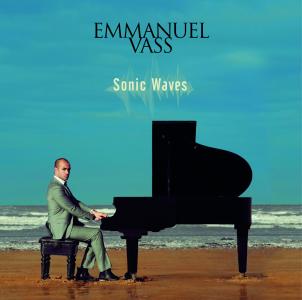
Manny is a hugely energetic as well as talented young pianist. He is not the sort of guy to wait for things to happen - he will make things happen. He has recorded two albums of very different music. He knows his Bach and his Liszt but he also knows his Gershwin and Queen. He is happy to get onto Radio 3 or Classic FM if he can; he wants to get to Fringe audiences if he can.
He comes from rural East Yorkshire; his is not the stereotypical classical music background - his father was a carpenter. Manny - eschewing agents - has set-up his own 24 date tour to promote his new album, Sonic Waves. This is why he came to Buxton.
Now I hadn't heard Manny before and I guessed that I was in for something like Ludovico Einaudi (and I would have been OK with that). But I was wrong. Sonic Waves is so titled because it is a collection of pieces - mostly from the mainstream classical repertoire - inspired in some way by encounters with, or experiences of, water. Chronologically this took us from a Handel hornpipe to Debussy. At the core of the programme were works by Chopin and Liszt.
As you might suppose this was a heartfelt programme of music. Yes, a Chopin prelude did remind us of the pitter-patter of raindrops but another study emphasised the great power of the seas; water is vital to us, but it is not necessarily our friend.
Not that Manny's playing is without wit or humour; his 'classical' arrangements of traditional sea shanties made it evident that for him music making should also be fun. What shall we do with the drunken sailor? made it clear that the sailor in question was very rowdy indeed. In The Sailor's Hornpipe the melody was tossed around as if by a stormy sea - sometimes in sight, sometimes obscured by waves.
A small but hugely appreciative audience was happy to have an encore and Manny showed a sentimental side to his character, playing a tune that was a favourite of his late grandmother - Gershwin's The Man I Love. And he played it beautifully.
Manny says he'll be back in Buxton. Those that heard him tonight will urge their friends to join them when he returns.
Keith Savage
SOUNDS OF SIXTIES CELLULOID - Hawthorne Clark
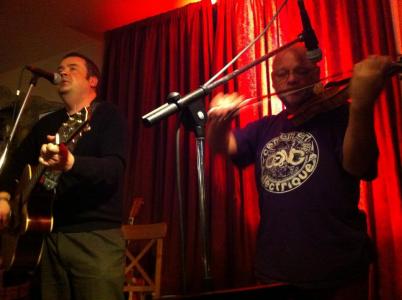
If you are from Buxton or are a Fringe attendee and like music the chances are you've heard of these guys as they regularly appear in both the Fringe and beyond. This show is the first of three chances you get to see them working together at this year's Fringe.
The show, to paraphrase one of those adverts, does exactly what it says in the title. Will and Graham take you on a tour of some of the most recognizable, and a few of the lesser known themes, from films of the 60s.
Theme tunes are by their very nature, memorable. I for one could recall all the movies that the tunes came from, even if I couldn't remember the composer. The audience too seemed to know all the films, even if Will admitted to not having seen it. That didn't spoil anyone's enjoyment.
There were some surprises, I won't tell you what, and some of the usual suspects and suffice to say that Bernard Herrmann's masterpiece for violin did make an appearance. Briefly. The guys had made some interesting arrangements of some of the standards and put their own mark on them, which isn't always easy to do.
Their playing was, despite the odd bum note, relaxed and 'together' as they say. If I had a quibble it would be that the sound balance between the two could be more even, but that's a minor point. Will and Graham seemed to enjoy themselves, and so too the audience. It was a good evening's entertainment which even had the Chair of the Fringe tapping his toes! All in all, a good time was had and they are playing again on the 16th and 17th at the same venue. So, get yourself a drink and relax.
Ian Parker Heath
SUMMER CHAMBER DELIGHTS - Cheshire Chamber Collective
Buxton Methodist Church
16th July
This was, as they say, a programme of two halves. The first half showcased a wind quintet which played three pieces, each of which delighted in very different ways.
They began with Franz Danzi's Quintet in G minor. Danzi - a German composer - was a contemporary of Beethoven but closer in spirit to Mozart. He wrote three sets of quintet for wind - flute, oboe, French horn, bassoon and clarinet.
His writing gives clear lines to each instrument and over the four shortish movements we get to hear some of the textural possibilities of this combination of instruments. So at times we hear the more piercing sounds of the flute and oboe set against the prowling bassoon and clarinet. The French horn meanwhile moves around gathering things together keeping everything tidy and in place.
William Walton's Facade is well known and here we heard a five movement suite rearranged for wind quintet. The music is witty, slightly tongue in cheek at times, and draws liberally on the work of other composers from the western classical tradition and popular song. There is a conversational style about the music, but whereas Danzi is polite and restrained Walton is much more gossipy in his approach.
The final piece for quintet was by another 20th century English composer, Sir Malcolm Arnold, who also had an eclectic approach to his work. Earlier in the week I had heard pianist Manny Vass arrange sea shanties in a classical style. I hadn't expected to hear some of them again in the same venue. Arnold's writing incorporates some dance elements. With Blow the Man Down the music finally subsides as if the man truly is blown over.
This was an excellent and enjoyable programme much appreciated by the audience. The quintet was made up by: Alex Kane (bassoon), Lindsay Kershaw (oboe), Anna Shipton (flute), Emma Tennant (clarinet) and Paul Sellers (French horn). This was not easy ensemble music to play - though it was made easy to listen to - so it was made all the more remarkable by the fact that Paul Sellers had stepped in at 48 hours notice because of Jennifer Ward's appendicitis. We wish her a speedy recovery.
The second half of the programme was filled by Beethoven's Septet in E Flat Major for violin, viola, cello, double bass, clarinet, horn and bassoon, Opus 20. This is a much loved part of the chamber music repertoire and was written before Beethoven was 30. As such it is a sunny piece bursting with melodic invention; there is none of the doubt or sense of anxiety that can be heard in his later "mature" work. We were treated to a confident and fluent account; there were one or two instances of tonal uncertainty but nothing that spoiled our pleasure.
In the septet the string players were: Angela Aiken (cello), Nicola Bright (violin) and Adrienne Spilsbury (viola).
We are fortunate to have such skilled musicians living and working nearby. Let us hope that they continue to visit Buxton.
Keith Savage
SUMMER CONCERT - Derbyshire City and County Youth Orchestra
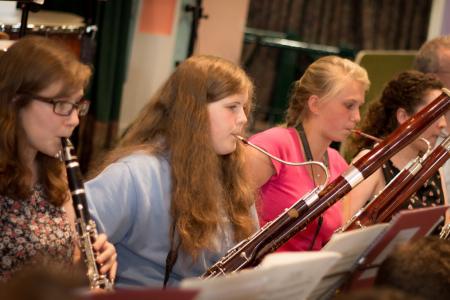
Conductor - Peter Stark
Leader - Freya Stokoe
.Soloist - Ana Sinkovec Burstin
DCCYO treated us (well over 300 audience) to an all Russian evening of the finest music, and full of variety. Unusually the concert began with Rachmaninov Piano Concerto No 3, which is a longish work and very demanding for both Soloist and Orchestra. Ana played with great affection and musicality, although I could have taken a little more weight and bravura playing. In spite of a big Concert Grand Piano, the soloist was often overshadowed by the orchestra. This is partly Rachmaninov's scoring which is a little enthusiastic, partly that the piano, large though it was, didn't have enough resonance for the size of the Octagon Hall, and partly that Ana was a little too gentle for the sound that Rachmaninov asks for. He was a very tall man with enormous hands, and very powerful when he needed to be.
However this work had such musicality, and drive. Particular mention must go to the Principal Horn, and of course the excellent string sound. There were some amazing "corners" in the performance and brought about by the skill and direction of the remarkable Peter Stark. There just may be bigger 'names' out there in the profession, but very few better musicians and almost none to equal Peter's ability to communicate with the players.
The second half started with Shostakovitch's Jazz Suite No 2 - and it began with a bang! What fun! This is not Jazz as we know it now, but more to do with Dance Music, and in the 1st movement March, almost a tribute to Sousa! The Lyric Waltz that followed began with wonderfully sleazy saxophones, some nifty accordion playing, and swaying bassoons! Waltz No 1 was very 'ballroom' and 'ballet', and could almost have been poking fun at Tchaikovsky at odd moments. The Polka was superb, and the tempo changes were managed with dexterity and charm. Waltz No 2 is the movement known by almost everyone, and the cheeky Saxophone playing was wonderful. The strings took up the challenge and ran well with it, trombones were a highlight, and swaying broke out throughout the orchestra.
Khachaturian's famous Spartacus and Phrygia Adagio showed off some fine flute playing with excellent trills, and also a splendid 'nostalgic' sound on the oboe. Clarinet, Cellos and solo violin were outstanding in the final moments.
Tchaikovsky's popular Capriccio Italien concluded the concert, and gives me a chance to praise the Brass section, and percussion. Both sections had been working really well all evening, but now was the time for them to shine, and shine they did. There were some really musical moments from the brass, and some incredible rhythmic pyrotechnics from the percussion section. How many audience spotted the lad standing on one leg in order to get the right number of 'notes' on the tambourine - impressive stuff; and his colleague swapping from cymbals to Bass Drum in an instant? The tuned percussion player was also very impressive - what a team. Well done Derbyshire - 2 nights running!
Andrew Hodkinson
SUMMER CONCERT - Derby & Derbyshire Schools' Orchestra
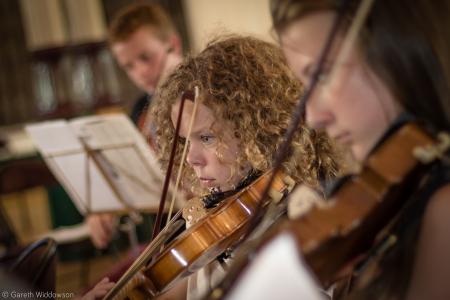
Whilst this might seem an unusual pairing of an Intermediate Youth Orchestra with a Professional Ensemble it worked extremely well and made for an entertaining evening's music making. Both groups played separately and also combined together, which as well as being valid educationally, also has musical benefits, certainly to the young performers but I suspect also to the adult professionals. Sinfonia Viva of course is a group of special performers who, as their information says, like to think outside the box, and enjoys working with young players.
Derby & Derbyshire Schools' Orchestra (DDSO from now on) began the evening with the Intermezzo and Farandole from Bizet's 2nd L'Arlésienne Suite,and in spite of clear evidence of nerves mixed with tiredness, they soon settled into the work. Playing in this very strange acoustic is not easy, but gradually they got the hang of the sound and gave a very creditable performance. The saxophone solo at the beginning was phrased well, as were subsequent solo spots. 'Clog Dance' and 'Flute Dance' from 'La Fille Mal Gardée' by Herold, followed and again ensemble suffered a little from the big space and acoustic, but there were some good solos on trumpet, flute, and percussion once the clogs had got together! Simon Bowler did his very best to be clear and incisive in his conducting, but sometimes the hall got in the way of togetherness.
Sinfonia Viva played us 4 very well known light music pieces, including a wonderful Trombone solo in 'The Acrobat' by Greenwood. All 4 pieces were very together and a delight to hear, but the Leroy Anderson 'Typewriter' (what's a typewriter Dad?) was a delight with Jonny Raper doing his stuff like a demented journalist, but one with immaculate timing!
The two outfits joined forces for a big sounding 3rd movement of 'Brahms Symphony No 4', which ran straight into the 'Creative Piece' improvised/composed by the players, and written out and directed by Filipe Sousa on themes and motifs from the Brahms movement. This was very impressive and successful, although what Brahms might have made of the Latin American section I'm not too sure!! The players certainly gave it their all!
After the Interval the two groups combined again for 'Dance of the Tumblers' by Rimsky-Korsakov and now the young players were really getting into their stride. After two more pieces by Sinfonia Viva including a fun arrangement of cartoon music (I counted 9 but could only guess the titles of 7), we returned the DDSO with Sinfonia Viva for the last blast.
This included Shostakovitch's 'Tahiti Trot', his variations on 'Tea for Two' in pseudo jazz idiom, and the Finale to the evening, none other than Tchaikovsky's '1812 Overture'. This brought the house down and the 300 plus audience demanded more; and more is what they got. Well done Derbyshire.
Andrew Hodkinson
SUMMER SERENADE - Bel Canto Community Choir

Buxton Methodist Church 19th July
This 40+ strong choir had come in two coaches from the Wirral bringing a huge selection of cakes and a summery punch - just for our benefit and pleasure. How lucky we were.
Community Choirs have become an important feature in many British towns and villages. They don't exist by and large to compete. Their purpose is often social - bringing together people who might not have the confidence to sing on their to create something joyous and wonderful. The Bel Canto Community Choir is an excellent example - they sing for the pleasure it gives them and their listeners but as their Musical Director, Clare Tucker, told us: "We have become great friends, we care about each other."
Clare seems to be a firm but encouraging MD guiding the Choir - and given the size of the Choir, the number of sections and the complexity of some of the arrangements that is quite a job. The programme was varied - including much that was familiar but presented in fresh and interesting ways.
The Choir is fortunate to have the excellent tenor Terence Robertson as a friend and he joined them in the first half for two solos. In a selection of songs from the British Isles he sang Londonderry Air and as part of a classical corner he sang Nessun Dorma with power and control. It will always be a pleasure to hear good songs well sung and Terence commands our attention, communicating his joy in being able to share his voice and give passion and meaning to the lyric.
The first half included a selection from Gilbert and Sullivan - bound to be well received in a town that has come to regard itself as the natural home of G&S. Never mind the why and wherefore is often to be heard around the town as part of a pun about the River Wye and its elusive tributary, the Wherefore.
After generous helpings of cake and punch the Choir returned with a programme of American songs. First a selection from musicals, film and television westerns: High Noon, Rawhide, Calamity Jane. To round off the afternoon we had four songs of friendship including Moon River and Bridge Over Troubled Water. As is evident their good taste extends beyond refreshments.
Only a dreadful cynic would not have enjoyed this recital. So heartfelt thanks to Bel Canto Community Choir - we hope that you enjoyed your visit to Buxton and will come again.
Keith Savage
�
TROMBONE TUNES, TROMBONE TALK - Sam Slide & Friends
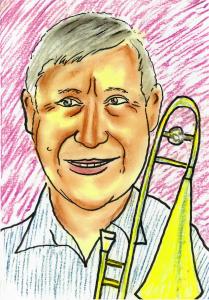
Sam Slide is a genuine Buxton Fringe success story – a man who was a regular audience member at multiple Fringe events (he still carries a very intricate planner to ensure he sees as much as possible), and then decided to embrace the Fringe’s philosophy by putting on a show himself.
That show is Trombone Tunes, Trombone Talk, in which Sam, a skilled trombonist chats about his life in music and plays popular tunes, in the company of his friends Graham and Neil on the keyboards and guitar respectively. The trombone is a very friendly-sounding instrument and Sam’s warm personality suits it down to the ground. His stories are unforced and conversational, and he maintains a friendly banter with the band throughout. As well as many trombone tunes, Sam also treats us to other instruments he has been associated with during his life – the recorder and the euphonium.
This is a popular show, by a popular man. It’s not necessarily polished (Sam and friends have only been rehearsing together for three weeks) but it doesn’t need to be – it’s just a fun evening. It could possibly be a tad shorter – it felt as if Sam was flagging by the end, and the theme of the show had slightly wandered – so perhaps an hour would make this show even better. Leave them wanting more, Sam. They certainly will.
Robbie Carnegie
THE WOLVES OF ST ELVIS PLAY SHAKESPEARE - Lutes & Ukes
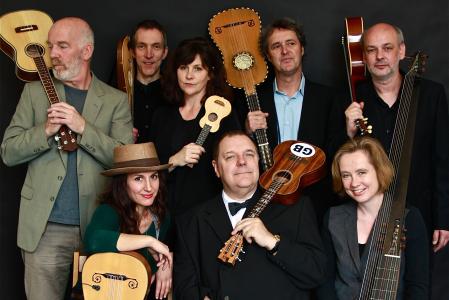
St John's Church 18th July
What was not to like about this show? From the charming and relaxed introductions by George Hinchliffe and his stories of St Elvis, through the eclectic repertoire including three Robert Johnsons, this was 90 minutes of pleasure.
I'm not sure how many of the audience (numbering around 300) knew that this Festival event was also part of the Fringe but let us not quibble about that. The band of eight was made up by four members of the Ukulele Orchestra of Great Britain plus four from the Theatre of the Ayre (though the delightful Clara Sanabras was identified as possibly swinging both ways on account of the riffs she had found on Renaissance guitar).
The simple points that this crossover supergroup were making was that the music of the 16th century clearly connects with the music of today, and that musicians across the ages work in a similar ways.
These points were made by the seemingly casual juxtaposition of ZZ Top and tunes from the Wolfenbuttel lute book (c 1460). To my ears the older music survived the treatment better - though it was great fun to hear rock and roll played on the theorbo. (I might be wrong but it seemed to me that the Ukes made the crossover more comfortably than the Lutes). Highlights otherwise included the 18th century French Plaisir d'Amour run into Elvis's reinterpretation as Love Me Tender. Shakespeare's contemporary Robert Johnson's beautiful song Woods, rocks and mountains and the unannounced Led Zeppelin medley Dazed and Confused and Stairway to Heaven. Some older Portuguese and Spanish songs were also easy on the ear.
More please.
Keith Savage